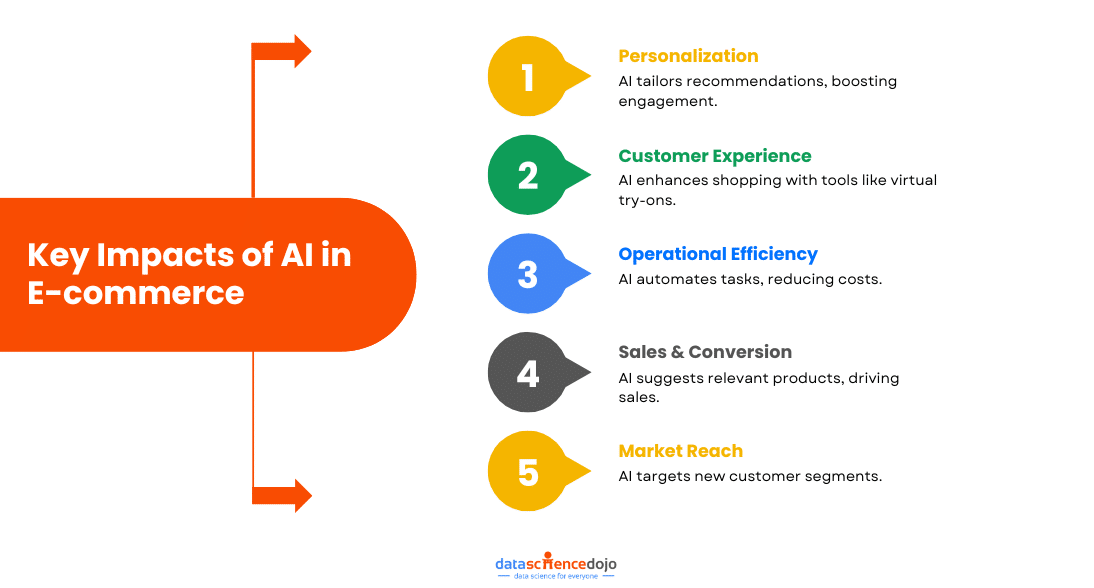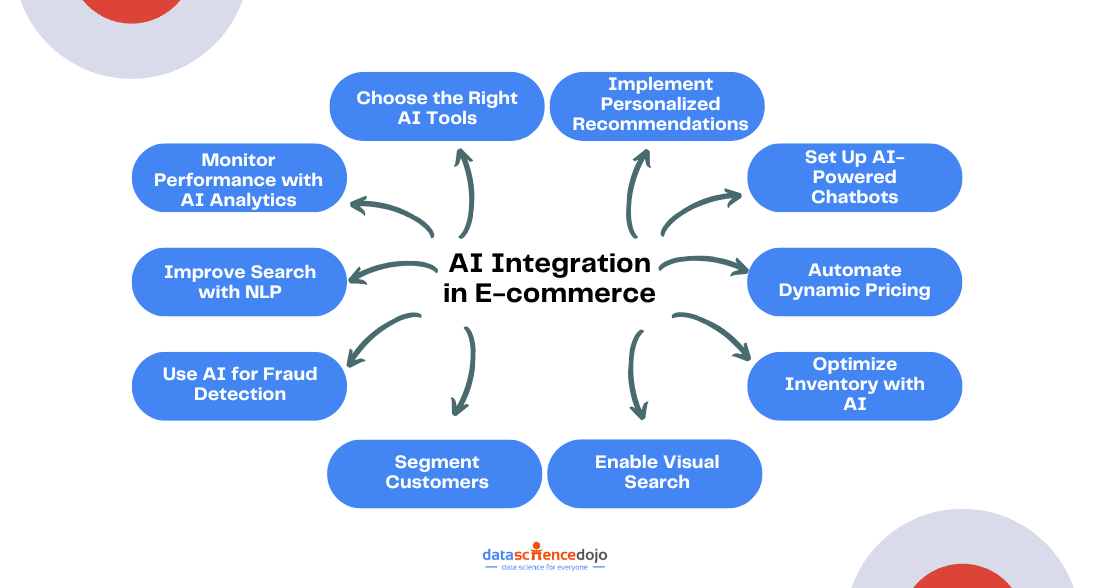AI in E-commerce helps businesses understand consumer preferences and profiles to tailor their offerings and marketing strategies effectively, thereby enhancing the shopping experience and increasing customer satisfaction and loyalty.
By analyzing consumer behavior, preferences, and profiles, businesses can personalize their products and services, optimize their marketing campaigns, and improve overall operations, leading to increased sales and a competitive advantage.
Also learn how to build a recommendation system using python
This understanding allows companies to not only meet but also anticipate customer needs, thereby fostering a stronger customer-brand relationship and ensuring efficient use of marketing budgets, which is crucial in a competitive online marketplace
Dive deeper into Artificial Intelligence
AI Impact on Personalized Shopping Experience
AI in e-commerce offers several key benefits that we’ll dive into. These include better personalization for customers, a smoother shopping experience, higher sales, and more efficient operations. We’ll also explore how AI helps businesses reach new markets and what the future holds for e-commerce with AI.
- Enhanced Personalization: AI analyzes customer data like purchase history and browsing behavior to offer personalized recommendations and promotions. This boosts engagement, satisfaction, and repeat purchases.
- Improved Customer Experience: AI features like virtual try-ons and smart search make shopping easier and more intuitive. These tools enhance user satisfaction, increasing loyalty and retention.
- Increased Sales and Conversion Rates: AI-driven suggestions help customers find relevant products, improving sales and conversion rates by presenting personalized options that match their needs.
- Efficiency in Operations: AI automates tasks like customer support and inventory management. This reduces costs and improves resource allocation, ensuring smooth operations.
- Broad Market Reach: AI analyzes data across demographics to help businesses tailor marketing strategies. This broadens market reach, allowing companies to target new customer segments.
- Future Opportunities: As AI evolves, expect innovations like hyper-personalized shopping, AI-driven voice assistants, and AR experiences. AI will also streamline supply chains and improve decision-making, boosting efficiency and convenience.
Learn more about AI driven personalization in marketing
Now that you’re aware of the powerful impacts AI in e-commerce can have, it’s clear that adopting these technologies is no longer optional if you want to stay competitive and succeed in the market.
Use Cases of AI in the E-Commerce Industry
AI in e-commerce is revolutionizing how businesses interact with customers and manage operations. From personalized recommendations to dynamic pricing, AI tools are creating smarter, more efficient shopping experiences.
Let’s explore the key ways AI is reshaping the industry and driving success.
- Personalized Product Recommendations: AI analyzes customer data to provide personalized product suggestions tailored to individual preferences and past buying behavior.
- Chatbots and Virtual Assistants: These AI tools offer 24/7 customer service, assisting with inquiries, providing support, and even in navigating e-commerce platforms.
- Dynamic Pricing: AI adjusts product pricing in real-time based on factors like demand, inventory levels, and competitor pricing, ensuring competitive and profitable pricing strategies.
- Fraud Detection: AI helps to detect and prevent fraudulent transactions by analyzing patterns that indicate fraudulent activities.
- Inventory Management: AI optimizes inventory by predicting trends, forecasting demand, and aiding in restocking decisions.
- Customer Behavior Analysis: AI tools analyze customer behavior to extract insights that drive more targeted marketing strategies and product development.
- Visual Search: AI enables visual search capabilities, allowing customers to search for products using images instead of text, which enhances the shopping experience.
- Enhancing Sales Processes: AI applications streamline and optimize e-commerce sales processes, improving efficiency and reducing operational costs.
These applications demonstrate how AI in e-commerce isn’t just the incorporation of fancy technology, but a game-changing force that’s driving smarter business decisions, enhancing customer experiences, and fostering long-term growth.
Learn about data science applications in the ecommerce industry
How AI in E-Commerce Works
AI in e-commerce works through a systematic process that starts with collecting data, analyzing it, and then personalizing the customer experience. Here’s how it unfolds:
1. Data Collection: AI systems gather vast amounts of data from various sources, such as browsing history, purchase history, and customer interactions. This data serves as the foundation for understanding customer preferences and behavior.
E-commerce platforms like Amazon collect data from various sources, including browsing history, what customers purchase, and how they interact with the site. This extensive data collection helps Amazon understand what products to recommend and how to personalize the homepage for each user.
2. Data Analysis: Machine learning algorithms analyze this collected data to identify patterns and trends. This analysis helps predict customer preferences and potential future purchases.
Using machine learning, Netflix analyzes viewing habits to predict what movies or shows users might enjoy next. This analysis identifies patterns in what content is watched and rated highly, allowing Netflix to tailor its suggestions to each user’s preferences
3. Real-Time Adjustments: AI adapts to real-time customer interactions on the website. It adjusts the shopping experience by recommending products or services based on immediate browsing habits and actions.
Online retailers like ASOS use AI to adjust shopping experiences in real-time. If a customer starts searching for vegan leather jackets, ASOS will start highlighting more eco-friendly fashion options across their site during that session.
4. Personalized Recommendations: Using predictive analytics, AI personalizes the shopping experience by suggesting relevant products. This not only includes products that a customer is likely to buy but also complementary products they might not have considered.
Spotify uses predictive analytics to create personalized playlists such as “Discover Weekly,” which include songs and artists a user hasn’t listened to yet but might like based on their listening history.
5. Customer Journey Personalization: AI maps out a tailor-fit customer journey, which enhances brand relevance and engagement by ensuring every interaction is personalized and relevant to the individual’s tastes and preferences.
Sephora’s mobile app uses AI to allow users to try on different makeup products virtually, tailoring the shopping journey to each user’s unique facial features and color preferences, enhancing engagement and brand loyalty.
6. Enhancing Conversion Rates: Personalization algorithms influence purchasing decisions by guiding users toward products they are more likely to buy, which improves conversion rates and customer satisfaction.
Zara uses AI to suggest items in online stores based on what the customer has looked at but not purchased, what they have purchased in the past, and what is popular in their region. This targeted approach helps improve the likelihood of purchases.
7. Continuous Learning: AI systems continuously learn from new data and interactions, which allows them to improve their personalization accuracy over time, adapting to changes in consumer behavior and market trends.
Google Ads uses AI to continuously learn from how different ad campaigns perform. This ongoing data analysis helps in optimizing future ads to be more effective, adapting to changes in user behavior and market trends.
Another interesting read: Marketing Analytics Features to Drive Greater Revenue
How to Implement AI in E-Commerce
Unless you know how to implement AI in your e-commerce business, it’s hard to truly reap the benefits. Simply having access to technology isn’t enough—you need to integrate AI in ways that enhance your customer experience, improve operational efficiency, and drive sales.
Let’s walk through the practical steps to successfully implement AI in your e-commerce strategy, so you can start seeing real results.
1. Choose the Right AI Tools and Platforms
Start by selecting the AI tools and platforms that best suit your business needs. There are plenty of AI-powered solutions for personalization, inventory management, chatbots, and more. Popular platforms include Shopify’s AI features, Salesforce Einstein, and various AI plugins for WooCommerce.
2. Integrate AI for Personalized Recommendations
Use AI to analyze customer data and browsing history. Implement recommendation engines on your website or app to suggest products based on previous purchases or searches. This can increase sales by guiding customers to items they might not have considered but are likely to purchase.
3. Set Up AI-Powered Chatbots
Implement chatbots for 24/7 customer service. Tools like Drift, Tidio, or Intercom offer AI-driven chatbots that can answer questions, help with product recommendations, process orders, and handle returns. This reduces the workload for your support team and enhances the user experience.
4. Use AI for Dynamic Pricing
AI can track competitor pricing and market trends to automatically adjust your product prices. Tools like PriceIntelligence or Omnia can help you set prices dynamically to stay competitive, maximizing profits while staying in line with the market.
5. Leverage AI for Inventory Management
AI can forecast demand and optimize inventory. With AI tools like Llamasoft or Relex Solutions, you can predict stock requirements, reduce overstocking, and avoid stockouts. This leads to efficient inventory management and a better customer experience.
6. Implement Visual Search Capabilities
Allow customers to search for products by uploading images. AI-powered visual search tools like Syte or ViSenze enable customers to find similar products to what they see online or in stores. This makes shopping more intuitive and helps increase conversion rates.
7. Use AI for Customer Segmentation
AI can analyze customer behavior and segment your audience based on their shopping habits, preferences, and demographics. Tools like Dynamic Yield or Segment can help create targeted campaigns for different customer groups, improving marketing ROI.
8. Deploy AI for Fraud Detection
To protect your business and customers, implement AI-powered fraud detection tools. Solutions like Kount or Signifyd use machine learning to analyze transactions and detect suspicious activities, reducing fraud and chargebacks.
9. Optimize Search with Natural Language Processing (NLP)
Implement NLP to improve search functionality. With AI-powered search engines like Algolia or Searchspring, customers can search using natural language, making it easier for them to find the products they want quickly and accurately.
10. Monitor Performance with AI Analytics
Leverage AI-driven analytics platforms like Google Analytics 4 or Kissmetrics to gain insights into customer behavior, sales patterns, and website performance. Use this data to make informed decisions, tweak your strategies, and boost overall sales.
AI in E-Commerce: Looking Ahead
To wrap it up, AI in e-commerce is not just a trend—it’s quickly becoming a game-changer. From personalized shopping experiences to smarter inventory management, AI is reshaping how businesses operate and interact with customers.
The potential for growth is huge, especially considering that global spending on AI in e-commerce is set to surpass $9.19 billion by 2025. This significant investment shows just how committed companies are to using AI technologies to boost customer experiences and streamline operations.
As more businesses tap into the power of AI, those who embrace these innovations will be better equipped to stay ahead in an increasingly competitive market. The future of e-commerce is bright, and AI is leading the way.






